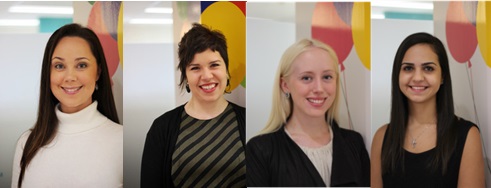The Behavioural Sciences Unit presented at the Australian Psychological Society (APS) Health Psychology Conference - Sydney, 11th April 2015
Dr Jordana McLoone, Deputy Leader of the BSU, set the scene by discussing the health risks childhood cancer survivors may face. Due to important advances in treatment, thankfully most children now survive cancer. However, some may experience complex psychological and physical ‘late effects’ as a result of their disease and/or treatment (skin cancers, dental problems, stress/anxiety, to name a few). Given that young survivors are a growing group, it is an important public health issue to consider how best to support and care for these individuals into the future.
Ms Christina Signorelli then presented findings regarding the dental habits of childhood cancer survivors, an important topic given their increased chance of developing dental problems. Survivors who attended a long-term follow-up clinic reported (i) visiting their dentist more often for cancer-related issues, (ii) greater awareness of cancer-related dental problems, (iii) higher perceived risk of future cancer-related dental issues, and (iv) placed greater importance on having access to a dentist through the follow-up clinic, compared with survivors who did not attend a long-term follow-up clinic. Long term follow-up care has potential to increase survivors’ understanding of late effects, and therefore improve the management of reversible dental late effects. This data has now been published.
Ms Brittany McGill presented the pilot data from ‘Cascade’, our online intervention for parents of childhood cancer survivors. Childhood cancer places enormous stress on families. We know from our team’s research that parents desire support as they resume their ‘normal’ lives after their child’s treatment, but that this support may not be available or easily accessed. Our online group program, which runs a lot like SkypeTM, provides parents with the psychological tools to manage difficulties in this period and re-engage with their lives in a meaningful way. Our preliminary data indicates that Cascade is feasible to run, and is an acceptable form of support, with parents providing us with lots of positive feedback about the program.
Dr Ursula Sansom-Daly’s presentation reported on findings of an interview study undertaken with adolescent and young adult cancer survivors to explore their understanding of medical information (referred to as ‘health literacy’). We now know that young people may have difficulties understanding confusing medical 'jargon'. We also know that young people may not have had much experience with doctors or the ‘health system’ prior to a cancer diagnosis, which can mean that they have not yet developed the skills needed to engage with these complex systems (and multiple health-care professionals!) Interview results highlighted factors that young people found helpful in supporting them to understand medical information, as well as things that made it more difficult. These results will be published later this year, so watch this space!
Social media, including Twitter, has an increasingly important role to play in keeping us up-to-date with new research. Reflecting this, the APS conference had two prizes – one of which was for the most re-tweeted tweets from the conference. Dr Sansom-Daly won the prize! Also excitingly, Dr McLoone was invited to be interviewed by the Australian Women’s Weekly after her presentation.
This year is going to be a busy and productive year for the team – we look forward to presenting our research at the 14th International Meeting on the Psychosocial Aspects of Hereditary Cancer in Manchester, UK in May, the Australian and New Zealand Children’s Haematology/Oncology Group (ANZCHOG) annual scientific meeting in Fremantle, Western Australia in June, and at the IPOS/APOS World Congress of Psycho-Oncology in July-August, held in Washington D.C., USA.

 RSS Feed
RSS Feed